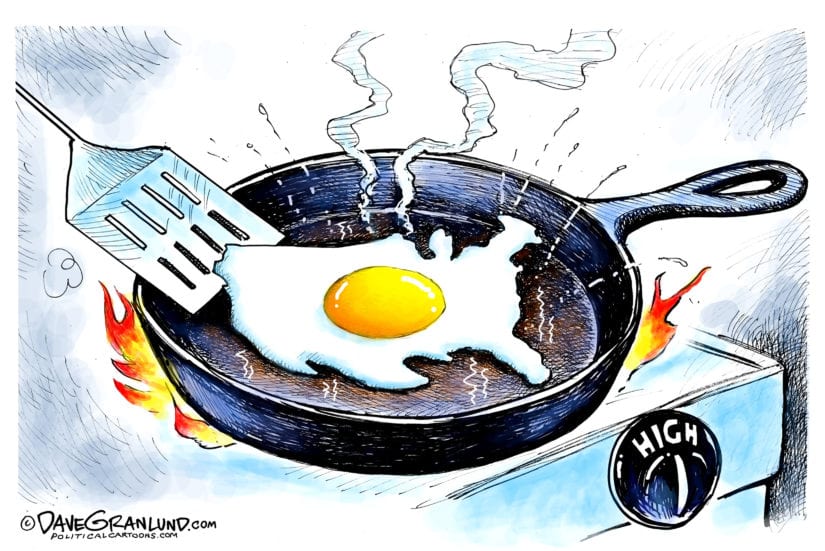BY JOHNSON BRIDGWATER
 While most of Oklahoma’s Congress members and state legislators continue denying climate change is real, a great number of the rural Oklahomans they are supposed to be looking out for have routinely been experiencing personal and financial damage and loss for many years.
While most of Oklahoma’s Congress members and state legislators continue denying climate change is real, a great number of the rural Oklahomans they are supposed to be looking out for have routinely been experiencing personal and financial damage and loss for many years.
Whether it was the extreme drought that decimated Oklahoma’s ranching industry five years ago, or the recent flooding in eastern Oklahoma this spring, many rural Oklahomans now count themselves among the growing list of climate change victims. They are starting to understand that “weather” and “climate” are two very different concepts, but that they are very much linked together.
This is the insidious nature of our climate crisis – it is not some “once in a lifetime moment” that can be written off after the fact and then forgotten. Our climate crisis has been driving catastrophes in rural Oklahoma for many years already, as thousands of Oklahomans can attest. And it will only worsen in the coming decades.
While state legislators continue attempts to pass legislation that would ban the discussion of climate change in Oklahoma classrooms [see Durant Sen. David Bullard’s SB 14 in the last session], and other Oklahoma elected officials keep singing the praises of fossil fuels and backing the loosening of methane regulations, their constituents are dealing with massive economic losses, extensive emotional trauma, and being told by state officials “Don’t worry about it, it is not real.”
Meanwhile, these losses to farming and ranching are having national economic impacts as the USDA is now strapped with relief payment requests from agricultural losses – and many years, it is Oklahoma that leads the nation in farm subsidy payments.
Countless Oklahoma ranchers, many of whom were multi-generational operators, were forced out of business permanently in the last five years – and all models show the drought and flood cycles will only worsen over time.
Agriculture depends on certainty and predictability – but both of these factors are becoming non-existent.
Fortunately for rural farmers and ranchers, there are many Oklahomans who do know that climate change is real, and organizations like the Oklahoma Chapter of Sierra Club are actively working to change attitudes towards climate change in our state, while also pursuing activism and advocacy to get our state and local government to pursue policy and practices that seek to minimize the coming climate crisis.
But it is not just “green groups” that are coming forward to sound the alarm about how our climate crisis is impacting Oklahoma farming and ranching families – the U.S. Environmental Protection Agency [EPA] recently issued a report stating, “Increasing droughts and higher temperatures are likely to interfere with Oklahoma’s farms and cattle ranches. Hot weather causes cows to eat less and grow more slowly, and it can threaten their health. Reduced water availability would create challenges for ranchers, as well as farmers who irrigate crops such as wheat. Yields are likely to decline by about 50% in fields that can no longer be irrigated. The early flowering of winter wheat could have negative repercussions on livestock farmers who depend on it for feed.”
Among farmers and ranchers themselves, the National Sustainable Agriculture Coalition is so alarmed by the impacts of climate change on America’s farmers and ranchers that they are actively engaged in elevating the issue of climate change into the federal agriculture appropriations process.
On May 21, they issued a formal statement to the United States Senate Committee on Agriculture, Nutrition and Forestry that included the following plea:
“Given the severity of climate crisis, as well as the need for incentives and support for farmers and ranchers on the frontlines of climate change, we also believe it is critical to scale up the resources and tools available for climate change mitigation and adaption. In order to reduce the risk to producers in shifting to new climate-friendly agricultural systems, we need to invest in relevant financial incentives, technical assistance, and research. It is essential that any national climate policy recognize the role that agriculture can and must play in avoiding the worst impacts of climate change, increasing soil health and carbon sequestration, and reducing greenhouse gas emissions. Climate change threatens agricultural productivity, as well as the viability and profitability of farmers and ranchers across the country.”
At the national level – despite the nearly complete lack of concern shown locally by Oklahoma’s elected officials – there are politicians who not only “get it,” they are calling out our federal government for trying to stick its head in the sand when it comes to climate change’s impacts on the agricultural sector.
U.S. Sen. Debbie Stabenow, senior member of the U.S. Senate Committee on Agriculture, Nutrition, and Forestry, has openly called out the federal government’s intentional practice of trying to ignore very real science and data proving that U.S. farmers and ranchers are getting hammered by climate change.
Earlier this year, Stabenow, D-MI, shared the following:
“As you know, the U.S. Senate Committee on Agriculture, Nutrition, and Forestry recently conducted a bipartisan hearing entitled, ‘Climate Change and the Agriculture Sector,’ where we heard about the profound impacts that farmers and ranchers can expect from unchecked climate change. It would be irresponsible and inexcusable to withhold important research information from America’s agricultural producers in light of this challenge.”
It will be up to all Oklahomans, including our farmers and ranchers, to start calling on our elected officials to make good on this request to be honest, and to get real, about what the USDA has found out – climate change is, and will continue to, drastically impact farms and ranches in Oklahoma and across the United States.
It is long past time that Oklahoma’s state government acknowledge the truth of climate change and begin working on policies and positions that will get to work taking care of our most vulnerable Oklahomans – the rural families that make up one of our state’s biggest and most historic industries, agriculture
Our governor, our secretary of Energy and Environment, and our cecretary of Agriculture all owe it to hard-working Oklahomans to put responding to climate change at the forefront of Oklahoma government’s concerns and actions.
– Johnson Bridgwater is director of the Sierra Club’s Oklahoma chapter and a regular contributor to The Oklahoma Observer







